Most people believe that the democratic system creates a democratic State. But what do these concepts mean? What beliefs do we hold about them? Do they make sense?
In our representative democracies, of various forms, we accept that we, the people, elect our representatives to deliver the policies which most closely reflect our wishes. In order to be able to enact the policies and make decision on our behalf, elected leaders require our authority, or so they claim. In so-called representative democracies we temporarily cede our notion of authority to our representatives by electing them. Once elected, our representatives are entrusted to make decisions on our behalf until we next have an opportunity either to re-elect them or elect someone else instead. Supposedly, this is representative democracy.
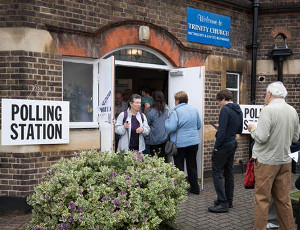
It is based on the understanding that the people we elect will work for the betterment of society. They may employ different methods, hold different perspectives and maintain differing ideologies, but we accept and trust most desire to make society a better place to live. Otherwise they wouldn’t stand for an office in the democratic State. Some bad apples may emerge, that’s human nature, but on the whole democracy empowers decision making by the people. If a kakistocracy comes to power, by exploiting the electoral system, we can get rid of it by electing something better at the next election.
Throughout history there have been many representatives or agents of the State who have genuinely tried to improve society and the lives of the people they ruled. Alfred the Great, Haile Selassie, Hugo Chavez, Anaurin Bevan, Nelson Mandela, Thomas Sankara and many others, have reformed the State, or its policies, for what they truly believed to be the benefit of the people. States around the world have produced leaders, statesmen and women, who had honest concerns for the welfare of the people and did what they could to improve people’s lives.
We tend to view improvements in the human conditions as evidence of the progressive development of the benevolent democratic State. Political history is seen as a steady progression from slavery to feudalism, monarchy to representative democracy, all moving broadly in a humanitarian direction. The argument being, that the State can always improve and be better. This is why we stay engaged with it, hoping for improvement.
It can be engineered by the people to be more focused on it’s duty of care and more responsive to the will of the people. Representative democratic State rule isn’t perfect, but it is the best system we can possibly devise in an imperfect world.
Or so we are given to believe.
An Alternative View Of The State

The State is also the source of the vast majority of injustices, crimes against humanity and, most notably, wars. State crimes, deception and propaganda, destructive policies, enforced austerity, restricted freedoms, abrogation of inalienable rights, unjust laws, miscarriages of justice and many other travesties also typify the history of the State.
Frequently the State is in opposition to the people and ignores its duty of care. Structural inequality of opportunity, poverty, health inequality, universal usury, economic and social injustice and deprivation are predominantly caused by the policies of the State.
Nor is the State immune to significant weakness. The State has frequently succumbed to bribery, corruption and coercion. Global corporations, industrialists, banking cartels and oligarchs have all used their wealth, power and influence to control the State and its policies.
None of these people are elected. There is not, and never has been, any democratic oversight of the powerful influences that often form the policies of the alleged democratic State. No one elects a think tank.
Rather than a process of progressive emancipation, the developmental political history of the State can be seen from another perspective. Despite the claimed benefits of representative democracy, the evolution of the State also evidences the incessant centralisation of all power in the form of itself and its agencies. Along the way the State has frequently committed barbarities on a horrific scale. In the modern technocratic era, the absolute centralisation of all power is seemingly in sight, as we move towards a single global State. The ultimate centralisation of all power.
If the history of the State is punctuated by well meaning individuals it is characterised by an obsession with the consolidation of power and “partnership” with unaccountable forces. Why would anyone keep voting for such a system?
Questioning The Idea of The State

What is the modern democratic State? It is a group of people we allow to rule us. In doing so we give this organisation supreme authority. We believe it rules by consent of the people, but no one pays taxes for policies they disagree with, obeys unjust laws or fights wars by choice. We do these things because we fear the repercussions of the State if we disobey. No one chooses to go to prison.
All these social costs are paid because we legitimise the sole authority of the State to initiate the use of force against us. Only the state can kick down our doors, kidnap us and incarcerate us against our will; the State has the unique “right” to physically assault people who do not obey its commands; no one has the right to extort money with menaces (taxation) or seize assets except the small clique of people we call the State.
Our electoral ability to give the State the right to initiate force, or threaten force, is fundamentally an erroneous belief. We would never give each other this right and would at all times resist anyone else who claimed they had the right to force us to do what they say. Yet, for some reason, we have come to believe that it is acceptable for this special group of people to have a right we instinctively oppose in all other circumstances.
Furthermore, none of us actually have the right to initiate the use of force in the first place. As individuals, we have no “authority” to force others to do as we say. If the State gets its authority from us, who among us gave it an authority we don’t hold ourselves?

We cannot cede either authority or rights that we do not first possess. How can the State possibly derive the right to initiate force if none of the people who elect it have that right themselves? It can’t, the idea is absurd. Yet it is the basis of what we call the representative democratic State.
Moreover, the right to initiate force does not exist. It isn’t an inalienable (or unalienable) right. The use of force is only a right in self defence, including survival, and even then it should be proportionate. This is a commonly understood. The State merely claims illegitimate authority to exercise a right that does not exist.
We have no experience of social progress absent State rule. We don’t know how, or if, our modern technological society would have developed without the State. Therefore, there is no evidence that society has benefited from State rule. It could equally have been nothing but a hindrance. Why should we believe in something without evidence?
We think the State we elect has created an egalitarian meritocracy. An essential message constantly reinforced by the State. Yet social mobility remains static and relative inequality persists. We only need to consider the tiny number of schools, universities, private members clubs and secretive societies the overwhelming majority of our elected leaders attend, and the vast wealth (backing) required to achieve high office, to know our social and political structure is far from meritocratic.
Egalitarian meritocracy is not the State system we have. Instead we believe in the State initiation of force, exercised by a nominal “elite” who have no moral justification to force anyone to do anything. The State has no authority. We just believe in its claim of fictitious authority without cause.
The Reality Of the State
We all seem to agree, by virtue of electing our aristocracy, they can kill us, beat us up, imprison us, seize our incomes and assets, determine what we can do, say and think, where we can go and even stipulate what our rights are. Belief in such a system can only be the product of indoctrination.

We are effectively agreeing to our ongoing slavery. We can’t be partly a slave or somewhat free. We are either free or someone else controls what we do. It may be to a lesser or greater extent, but if our actions are controlled by someone else to any degree, we are not free.
If the means of that control is the use, or threat, of force we obey because we have to. There’s no choice, regardless of who we vote for. We can’t vote to remove the State. We have never been offered that choice.
We are slaves who do what we are told because we are frightened of the repercussions if we don’t. This is not freedom. It is slavery.
The abolition of slavery never happened, it just shifted in form. Enslaving far more people, to a lesser degree, in representative democratic states, while maintaining comprehensive slavery for billions in others. Either way, all states are slave states.
No logical, moral, sceptical man or woman would ever agree the initiation of force is justified. Yet, not only have we based our entire civilisation upon this belief, we actively fight to protect the State’s “right” to use force against us. This evidences powerful, systemic brainwashing on a generational and global scale.
Given the appalling injustice, conflict and genocide still rampant in the world, at some point, after thousands of years of State rule, surely we can legitimately question if the problem is not, in fact, the concept of the State itself? Or are we destined to be forced to obey the diktat of a select few forever?

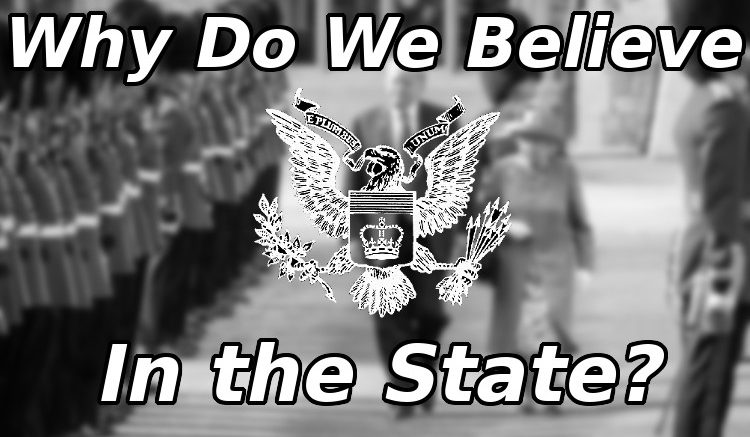
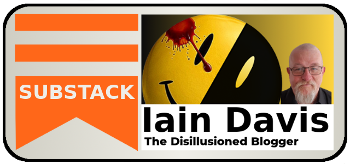

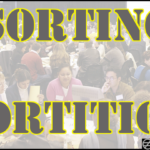
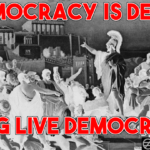
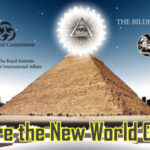
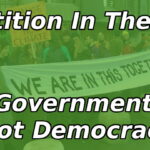
Wish more folks actually read your work Iain. My only criticism of your work is this. It is too cerebral and requires thinking readers to be comprehended and absorbed. What good investigative journalism used to be once upon a time. Please review Caitlin Johnstone’s work. Her writing succeeds because it has pith and is therefore less highbrow and more accessible that yours. Mores the pity. Please keep up the fantastic work Iain. I would be very disappointed to lose your valuable contribution.
Thanks for the feedback Stuart. Don’t worry I’m not intending to give up and am looking at ways to protect my output from the coming censorship purge. I absolutely agree with your assessment. I’m a big fan of Johnstone’s work and recognise I need to adapt mine if I want to achieve any measure of popularity. My problem is that once I start looking into something or researching a topic I try to fit everything into one article and often stray into the verbose. I appreciate the advice mate. I’m on it.
On the contrary, I found your writing style in this article to be an easy read, informative, contemplative with visual aids that demonstrate how the lesser ranks seem to enjoy the enforcement power bestowed by our ‘State masters’. I posted this article on Facebook and would hope this might lead to others logging into your website as it appears to be a huge source of reasoned argument.
On another point, though, I did try to download a freebie having put my email address in and selecting the book title but clicking on subscribe button immediately below didn’t take me anywhere. As a less-enlightened computer geek perhaps you could give me some instruction so that I can read a couple of your books before joining you on an annual basis.
Thanks Connie for the encouragement and kind words. I’ll check out the book links to make sure they are working and will get back to you by email if that’s OK. Thank you for drawing this to my attention.
Found your site from Dr. Mercola. He just posted some information that you put out. Glad I have you in my arsenal of information. God bless and keep’em coming!
Will do Bob. Thanks for the encouragement.
Virtually every country in the world is now ruled by a kakistocracy. Very good article!
Appreciated Dave. Yep, unfortunately we keep voting harder in the hope that something will change.